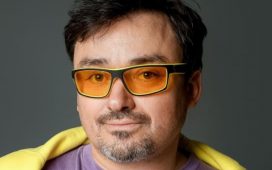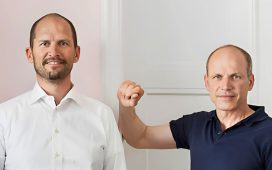Imagine refuelling satellites in space. Two young men did. They took their proposal to a businessman-cum-scientist in Bengaluru. But, he closed their painstakingly made file and threw it back to them. He said: “Find a lucrative job and save your family. Do not spend time on unwanted things.” They walked out with their heads down. Even their family members scoffed at the idea—a fuel station in space—calling it a fantasy.
But, they dreamt on. A decade later, the duo met the scientist who had shown them the door at a tech event. He was now singing a different tune. “I thought you would not make it,” he said. “Now you have made it a reality. I realise it was not a fantasy.” In the intervening decade, the duo, Sakthikumar Ramachandran, 35, and Nikhil Balasubramanian, 30, had launched a startup—OrbitAID—based out of the Indian Institute of Science, Bengaluru, and backed by the government of Tamil Nadu. They are now ready to take their dream to space.
There are thousands of satellites in orbit, more than 400 of them launched by ISRO. These satellites are usually designed to carry fuel for 15 years. After that they cannot keep their orbit position and start to drift. They slowly lose communication and become redundant, eventually turning to space debris. If these satellites can be refuelled in orbit, that would allow greater manoeuvrability and extend the life of a mission.
Sakthikumar and Nikhil are part of a new kind of space race—the emerging field of on-orbit servicing (OOS). It involves refuelling satellites, extending their lifespan and reducing waste in space. OrbitAID is the first Indian company in OOS. It has designed tanker satellites which will go to space and refuel client satellites. The idea may sound ambitious, but this new frontier in space privatisation is estimated to have huge potential. According to Northern Sky Research, a satellite and space market research company, the OOS market is worth around $18 billion and at least one-third of that is refuelling.
The two men who are leading India’s entry into this exciting market are from diverse backgrounds.
Sakthikumar hails from a middle-class family in Vadakkalur, in the backward Perambalur district in Tamil Nadu. As a boy, he was passionate about science and felt it could explain every change in nature. Therefore, though surrounded by those who preferred literature or law, he considered science a worthier pursuit. Spending his nights watching stars on his terrace led to a keen interest in space. To get access to books on the subject, he depended on the district library and later a reader’s circle.
Working their magic: The duo conduct an experiment | Bhanu Prakash Chandra
The youngest of three siblings, he went to a government school in Perambalur. His father was a deputy block development officer at the collector’s office and his mother a homemaker. Growing up in awe of ISRO’s achievements, he wanted to find a solution to an unsolved problem. After his schooling, he completed his graduation in aeronautical engineering from VSB college in Karur and his postgraduation in space engineering and rocketry at the Birla Institute of Technology in Ranchi. In 2011, he joined the IISc as a researcher in the satellite propulsion department.
His wife, Aishwarya P., is a special educator. She was drawn to Sakthikumar’s passion for science and has been a constant source of support in his entrepreneurial journey. A voracious reader of science fiction, he also used to run an NGO in his hometown to help economically backward children. “I will have to ensure that the pause button is pressed sooner or later to help more children, once my startup becomes successful,” he said.
Nikhil joined IISc as an intern in 2014. He was roomed with Sakthikumar. Nikhil was doing his bachelor’s in mechanical engineering at the Coimbatore Institute of Technology (CIT) at the time. During his three-month aerospace engineering internship at IISc, he got influenced by Sakthikumar’s ideas about space technology. The two remained in touch even after the internship and Nikhil, inspired by Sakthikumar, went on to complete his master’s and doctorate in the aerospace domain from Technion, Israel, and the Technical University of Munich, respectively.
Nikhil is from an upper middle-class family. His parents are both cost accountants from Kerala; his father is from Palakkad district and his mother is from Kottayam. He was born in Kottayam, but the family moved to Coimbatore when he was three. His father runs a financial and accounting consultancy there and now helps OrbitAID with finance and compliance related issues. Nikhil is married to Benazir Begam Mohamed Ali, who was his batch mate at CIT and is now a product consultant at a German company.
During their work at IISc, the two men characterised the propellents mainly used in satellites. They also got projects from ISRO, the Defence Research and Development Organisation and some private companies in the satellite design field. This gave them invaluable exposure to satellite technology. They also researched fuel consumption of satellites and how long satellites can stay active in orbit. This led to the spark that would become OrbitAID.
As they went back to their room after a long day’s work, Sakthikumar asked Nikhil what he thought about a fuel tanker on orbit. As the two discussed and developed the idea, they also worked on various other projects that involved propellants and thrusters used in satellites. They also worked on “initial characterisation” of thrusters for ISRO missions, including Chandrayaan 2. “Initial characterisation means studying the behaviour of the engine pressure and the injector,” said Sakthikumar.
This hands-on experience further fuelled the spark. But, now there was another consideration. By providing an option for refuelling, the cost of satellite launches could be reduced as fuel at launch can be cut down. As a result, OrbitAID’s first mission was to develop a constellation of tanker satellites to establish a fuel station in space.
These tanker satellites are equipped with the technological capabilities necessary for docking and fuel transfer to client satellites. They will be strategically positioned in various orbits and will carry a range of fuels, including monopropellants, bi-propellants, and electric propulsion fuels, depending on the specific needs of the client. “Every year, functional satellites that provide weather data, communications, and other essential services retire because of fuel depletion, becoming space debris,” said Sakthikumar. “Just as there is a robust refuelling ecosystem currently available for ground-based locomotives, a similar ecosystem is necessary in space for the efficient utilisation of spacecraft resources.”
With an aim to simplify the on-orbit fuel availability and promote circular space economy, Sakthikumar and Nikhil have been developing this solution at their lab at IISc. They are poised to launch their first payload to space this year.
The name they chose for the company—OrbitAID—indicates their ambition. “Initially, we thought that the name should connect with refuelling,” said Sakthikumar. “But, later we decided that we are not going to stop with refuelling and are going to venture into a bigger space like in-orbit servicing of satellites. So this was the apt name.” The two invested close to Rs50 lakh in all and OrbitAID received Rs4.5 crore as investment from the Tamil Nadu government’s startup mission.
OrbitAID invented a new docking system for refuelling that can work with existing systems on satellites. “We came up with an integrated mechanism which will take care of docking plus refuelling the satellite,” said Sakthikumar. “We did this in 2014-2015.”
Even though OrbitAID is in the process of launching its tanker satellites, it is already considered one of the most exciting space tech startups globally. It has been named as one of the world’s top 20 space tech startups in a study that analysed 1,544 startups. It has signed agreements with six companies in India and Germany. Slowly, it has also established connections with companies in Europe and the UK, and also with the space agency in Germany. “We have a good connect with a few space agencies in Germany, Europe and the UK,” said Nikhil.
There are a few OOS companies functional across the globe, supported by NASA. The UK-based Effective Space Solutions, which manufactures spacecraft intended to extend the life of communication satellites, and the Northrop Grumman Corporation, an American multinational aerospace and defence technology company, are the big players in the industry. OrbitFab, a US-based startup company, is a competitor for OrbitAID. As of now, Sakthikumar and Nikhil both feel that OrbitFab, which is focused on refuelling satellites, is their only competitor.
It looks like the time is ripe for the OrbitAID boys to reach for the stars.











